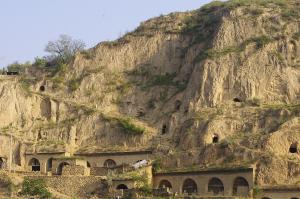
Source: Wikimedia user w0zny
License: Creative Commons
There’s a reason no one’s ever found Jimmy Hoffa’s body. Ask anyone lucky enough to inhabit the north-central part of the Garden State and you’ll learn the truth: this is a densely populated, paved-over swamp. It’s such a bog that we have a whole national wildlife refuge named the “Great Swamp.” Mosquitos multiply like plague-ridden fleas; summers are humid enough to make the sweat stick to your skin day-in and day-out. But it has its benefits, and we get an actual winter, unlike in certain formerly Confederate climes. Above all, nothing is scarier to the New Jerseyan than desert, a vast expansive of dry nothingness. To us, hell is being trapped in the Grand Canyon with no gravy.
Ipso facto, Chen Kaige’s Yellow Earth (1984) is among the most spine-chilling movies ever made. The landscapes of vast parched earth, zigzagging like the cliffs in the background of a Byzantine icon, dominate the few human beings who try to live in such a place. They, dwarfed like dust mites in a sea of rigid fibers, drool before, sing in, and curse the central fact of their existence: they are always about to die. Cultivation on such steep, ochre hills is hard enough in good times. Chen’s movie takes place during a drought, peasants crying out to hard, deaf hills, cloudy skies shattered by indominable yellow earth.
Set in 1939, the film tracks Gu Qing (Wang Xueqi), a soldier in the communist forces based at Yan’an sent to the remote, Kuomintang-controlled reaches of northern Shaanxi, to collect folk songs from the local peasants. These folks are so poor that at a wedding they serve two wooden fish per table, a hard, splintery substitute for a traditional sign of prosperity and joy. While among the people, he stays with a family. The Father (Tan Tuo) is a kindly, grizzled widower with an air of brokenness and resignation about his every word (not that he says much). He has three children. One daughter has been married off to an abusive husband, leaving two at home: the mute shepherd boy, Hanhan (Liu Qiuang), and the enterprising young watercarrier, Cui Qiao (Xue Bai). Brother Gu’s tales of women learning to write and serve in the military, of people picking their owns spouses, and of a bright communist future, spark Cui Qiao’s imagination and kindle, slowly but surely, a desire to escape to Yan’an. She, however, is betrothed just as Brother Gu returns to his base. The central tension of the story amounts to: will he, as he has promised, return in time to save her from a life of abuse and servitude?
The human answer to the dead earth’s dominance is song. It becomes their only way of making their mark on terrain that will not give life. Echoing voices must, it seems, amount to something. Cui Qiao sings as she carries water three miles from the Yellow River to her cave-home. Hanhan first speaks in song, belting out about how he and his comrades will pee their beds until the drought is ended. Before he knows it, he’s singing Brother Gu’s communist marching songs instead.
These, however, are rarely happy tunes. A local peasant rehearses the blessings of marriage at the paltry feast. Brother Gu, impressed by the man’s skill, compliments his voice to the villagers. “Yes,” one replies. “But he is destined for unhappiness. He is thirty and not yet married.” When the cadre tells his host that these songs are to be chanted by their army to inspire the local peasants and remind everyone what they are fighting for, the wrinkled cave-dweller laughs. “Why come here? We have only bitter songs.”
Chen’s camera captures the impression made on these people and their world by the towering yellow rock all around them. Hanhan stares blankly, loving but already attained of some stoicism beyond stoicism. The Father’s face makes Charles Bukowski look like a model of clean living. In a quasi-comedic line, we learn that he is only 47. The villagers’ teeth are broken, their faces contorted beneath sweat-stained turbans. Chen uses only natural light so that smoky, bleak interiors are always choked in hazy darkness. We rarely get a full glimpse of anyone. What we see tells us enough.
It is the final sequence, though, that makes the movie. Brother Gu returns to the villagers, eye-catching green wreaths atop their heads, praying to the Dragon King to end the drought. Chen’s resolution, however, is no simple vindication of the CCP. It reflects the hope of a people forged in a century of humiliation, enlivened by triumph over the Japanese and warlords, only to endure the famines of the mid-20th century, in which tens of millions died. Whatever changes, whatever hopes rise and whatever despair drags down, the yellow earth remains. It, like a wall set between man and heaven, abides.













